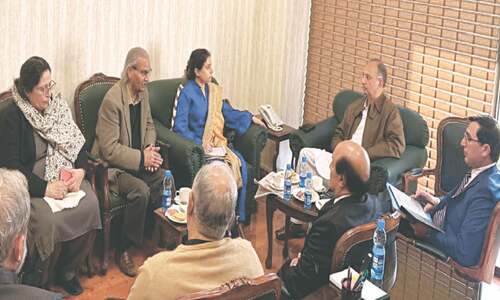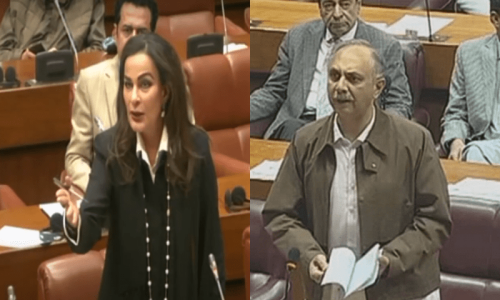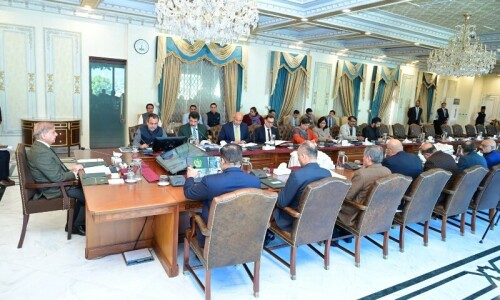LONDON, Jan 10: The Special Investigation Group (Sig), modelled on MI5’s Joint Terrorism Analysis Centre and partly funded by Britain, has been assigned the exclusive task of countering terrorism in Pakistan, claim Adrian Levy and Cathy Scott-Clark in a report (“On the trail of Pakistan’s Taliban”) published in the Guardian on Saturday.
Headed by Tariq Pervez, a former FIA chief, the Sig currently is said to be a tight-knit cell of 37 full-time specialists, expected to be expanded into a 300-strong force with an investigation division, an armed wing, an intelligence department and a research section.
In return for Britain’s financial and technical help London is said to have asked for access to the Sig’s raw data and captured extremists who might throw light on British plots.
Recounting a visit to the Sig headquarters, the writers claimed they were allowed “to witness the workings of the Sig as they investigated the Marriott plot, found common threads that led to the Mumbai attacks, and built up a picture of a new terrorist structure in Pakistan”.
“The Sig director takes us upstairs to a suite of offices where his men busy themselves at computers, their workstations stacked high with blue paper files. Beyond lies the Sig lab, where technicians are poring over scraps of clothing, hair and shrapnel, using tweezers, tiny brushes and miniature shovels --- kit sent over by the FBI and Scotland Yard’s anti-terrorist squad. Pervez’s men are learning to secure a blast site for DNA evidence, scouring it for flaps of skin or shards of bone. “ ‘We are trying every new method to identify the bombers,’ a senior officer says, explaining that since an explosive jacket usually decapitates the wearer, heads can be recovered, or at least fragments of the skull and face. These body parts are packed in ice and flown down to plastic surgeons at a hospital near Karachi for reconstruction.
“Pervez says: ‘Since one-third of Pakistan’s adult population does not have any form of identification, these remains are often the only link back to the madressah that indoctrinated the bomber and the extremist group that dispatched him.’“ ‘The suicide bombers would be nothing without the bomb makers,’ says Pervez, describing how men in caves and cowsheds, operating with a generator, a soldering iron and a pair of pliers, have become eminently adaptable. Exploiting what was readily available was critical to the bomb-makers’ success.
“Most large towns in the Punjab have textile factories that use potassium chlorate as a colour fixative. ‘After only some minor adjustments, adding sawdust or petroleum jelly, it becomes a powerful explosive,’ Pervez says. “ ‘Pakistan is now a one-stop shop,’ Pervez says. ‘Ideas, logistics, cash from the Gulf. Arab guys, mainly Egyptians and Saudis, are on hand to provide the chemistry. Veteran Punjabi extremists plot the attacks, while the Pakistan Taliban provide the martyrs. And it all came together in the Marriott case.’
“The clues to this assault and hundreds of others can be found in the Sig’s database consisting of a bewildering mass of names, groups and aliases, charities and welfare associations, which the British are keen to access, and which has enabled the Sig to identify four bomb factories and the names of 160 key suspects, 66 of whom have prices on their head, with around 20 classified as masterminds.
“Number one on the list is a diminutive 32-year-old, Matiur Rehman, whose career perhaps best illustrates why the British government is prepared to gamble £6m on Pakistan’s counter-terrorism experiment.
“Rehman was born in the Punjab in 1977, educated in a madressah, graduating into the extremist group Jaish-i-Mohammed, where he became an explosives expert.
“When Pakistan signed up to the ‘war on terror’ after 9/11, Rehman joined an Al Qaeda cell in the tribal areas. From there he conceived the idea of mounting suicide attacks on five-star hotels as early as 2002. He is thought to have played a role in the Marriott and the Mumbai hotel attacks.
“According to the Sig database, Rehman is also the main conduit for foreigners, especially from Britain, who arrive in Pakistan looking for terrorist training, including at least one of those involved in the 2006 liquid bomber’s plot.
“The closer you get to Baitullah Mehsud, the more of his strategy you can see. He is estimated to need one billion rupees (£8.6m) a year to keep his operations going. ‘It’s Jihadi Inc out here,’ one senior police officer says.”














































Dear visitor, the comments section is undergoing an overhaul and will return soon.